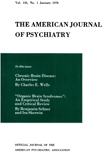THE TREATMENT OF DEPRESSIVE STATES WITH G 22355 (IMIPRAMINE HYDROCHLORIDE)
Abstract
Over a three-year period, more than 500 psychiatric patients of various diagnostic categories were treated with imipramine hydrochloride. It was demonstrated that the compound has potent antidepressant action. Best responses were obtained in cases of endogenous depression showing the typical symptoms of mental and motor retardation, fatigue, feeling of heaviness, hopelessness, guilt, and despair. The condition is furthermore characterized by the aggravation of symptoms in the morning with a tendency to improvement during the day. Treatment with imipramine hydrochloride resulted in full or social recovery in a high percentage of the patients. As a rule, the initial response was evident within 2 to 3 days, while in some cases 1 to 4 weeks of therapy were required. In view of the symptomatic nature of the action of imipramine hydrochloride, therapy must be maintained as long as the illness lasts. The side effects noted were relatively slight, and with the exception of one case of severe allergic exanthema necessitating discontinuance of treatment, no serious complications were encountered. In some cases of depression, particularly those associated with organic brain damage or schizophrenic psychosis, transitory states of agitation or exacerbation of the psychotic features were noted. These observations suggest the importance of a proper selection of the patients as to type and etiology of depression. While in a number of instances, neurotic, schizophrenic or other depressions were also benefited by the drug, particularly when used in combination with chlorpromazine, electroshock or psychotherapy, it is concluded that imipramine hydrochloride is primarily indicated and effective in the treatment of endogenous depression.
Access content
To read the fulltext, please use one of the options below to sign in or purchase access.- Personal login
- Institutional Login
- Sign in via OpenAthens
- Register for access
-
Please login/register if you wish to pair your device and check access availability.
Not a subscriber?
PsychiatryOnline subscription options offer access to the DSM-5 library, books, journals, CME, and patient resources. This all-in-one virtual library provides psychiatrists and mental health professionals with key resources for diagnosis, treatment, research, and professional development.
Need more help? PsychiatryOnline Customer Service may be reached by emailing [email protected] or by calling 800-368-5777 (in the U.S.) or 703-907-7322 (outside the U.S.).



